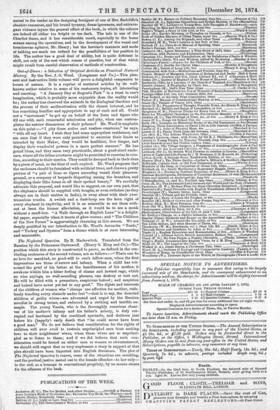The Neglected Question. By B. Markewitch. Translated from the Russian
by the Princesses Ouroussoff, (Henry S. King and Co.)—The position which this story is constructed to prove, as defined in the con- cluding sentences of the second volume, are as follows :—" There can be n9 love for mankind, no good-will to one's fellow-men, when the first impressions are those of sorrow and infamy. When a child has wit- flossed the grief of his father at the heartlessness of his mother, it awakens within him a bitter feeling of shame and inward rage, which no wise sayings, no well-sounding phrases, can destroy or root out. He will be filled with a premature, suspicious hatred ; and suspicion and hatred have never yet led to any good." The rights and interests of the children of women who "change one affection for another, ruth- lessly treading every obstacle under foot "—that is to say, the deserted children of guilty wives—are advocated and urged by the Russian novelist in strong terms, and enforced by a striking and terrible ex- ample. The young Vassia, who is the thoroughly conscious obser- ver of his mother's infamy and his father's misery, is duly cor- rupted and hardened by the combined spectacle, and declares jut before his (happily) early death that "he could never have been a good man." We do not believe that consideration for the rights of children will ever avail to restrain unprincipled men from making love to their neighbours' wives, when those wives are so unprinci- pled as to listen to them; and if we did believe that such con- sideration could be forced on either men or women so circumstanced, we should still regret that so very unpleasant a story in support of that plea should have been imported into English literature. The plot of The Neglected Question is coarse, some of the situations are revolting, and the poetical justice meted out to the female offender—to her only— in the end, as a homage to conventional propriety, by no means atones for the offences of the book.


































 Previous page
Previous page